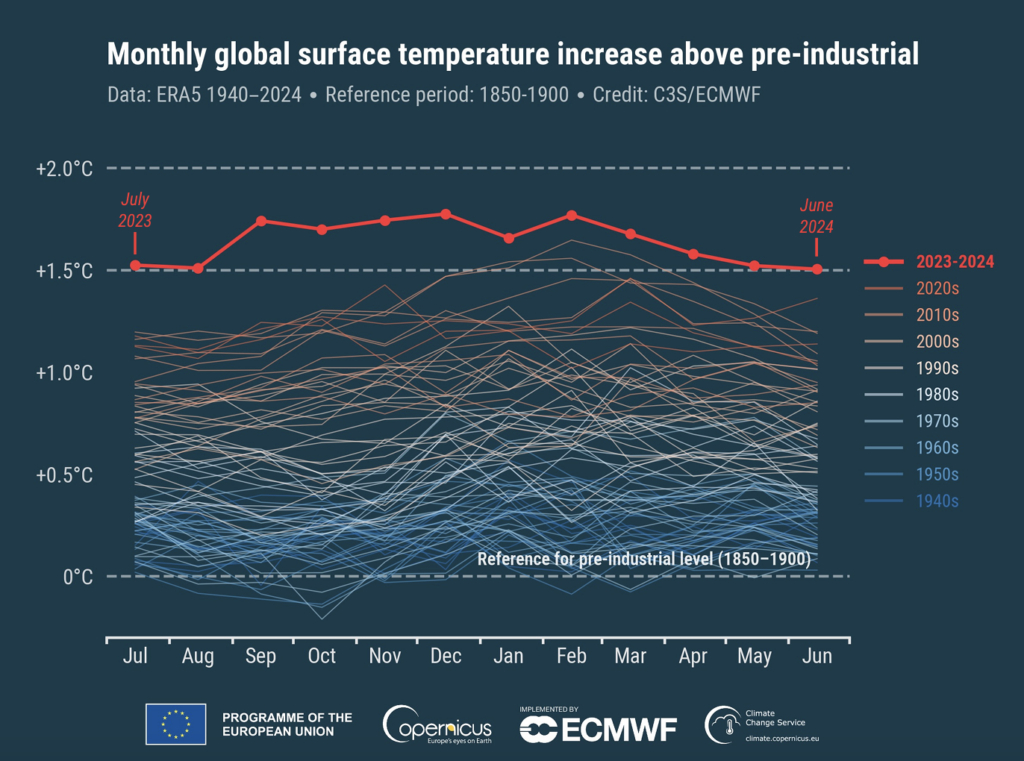The summer in the UK so far has been tame, to say the least. However, around the world, temperatures this summer have been exceptional. There is now talk that this year could be the hottest ever. In June, the EU’s climate change monitoring service said it was the hottest June on record. A number of scientists think this puts 2024 on track as the hottest recorded year globally.
Climate change has already had a dire impact this year. Over 1,000 people died during the Haj pilgrimage in Saudi Arabia last month. Record deaths in Dehli, India, and an extended heat wave in Greece have also been recorded.
Temperatures between July 2023 and June 2024 were the highest on record, according to scientists, making a year-long stretch in which the Earth was 1.64C hotter than in preindustrial times. To ward off the worst effects of climate change, we need to try to limit global warming to just 1.5c above preindustrial levels, which forms the Paris Agreement.

Monthly global surface air temperature anomalies (°C) relative to 1850–1900 from January 1940 to June 2024, plotted as time series for all 12-month periods spanning July to June of the following year. The 12 months from July 2023 to June 2024 are shown with a thick red line, while all other 12-month periods are shown with thin lines shaded according to the decade, from blue (1940s) to brick red (2020s). Data source: ERA5. Credit: Copernicus Climate Change Service /ECMWF
What is the Paris Agreement?
On 12 December 2015, during COP21 in Paris, world leaders agreed to substantially lower global greenhouse gas emissions and to actively work to limit global warming to just 1.5c above pre-industrial levels. This agreement became the landmark Paris Agreement. The battle to limit climate change to 1.5c, as outlined in the Paris Agreement, will be either won or lost this decade, according to some scientists, meaning we don’t have a huge amount of time left to make positive, lasting change.
Greenhouse gas emissions are now back to pre-COVID levels. The World Meteorological Organisation states that average global surface temperatures for each year from 2024 to 2028 are expected to be between 1.1 and 1.9 degrees higher than the 1850 to 1900 average.

Can burning wood help lower global emissions?
Despite misleading information in some media outlets, burning firewood, if done so correctly, is highly environmentally friendly and sustainable as long as:
1. You’re sourcing wood from sustainable woodlands
2. You’re burning seasoned wood
3. You’re burning this seasoned wood on an Ecodesign stove
Woodlands MUST be sustainable. Here are a few key facts about woodlands and forests:
1. Forests cover around 30% of the world’s land area
2. Forests contain most of the world’s biodiversity and almost as much carbon as in the atmosphere
3. Directly and indirectly, forests and woodlands provide livelihoods for over one billion people
4. Forests influence the availability of water, regulate surface and groundwater flows, and also help maintain high water quality
5. Forests and trees reduce water-related risks such as landslides, floods and droughts.








